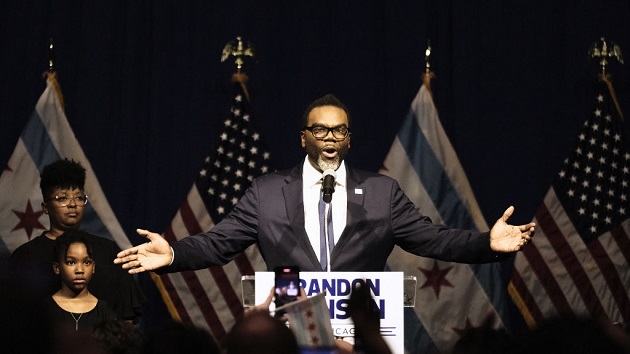(CHICAGO) — Before his victory speech Tuesday, Chicago’s mayor-elect Brandon Johnson was introduced at the podium by the president of his greatest benefactor: The Chicago Teachers Union (CTU). The alliance, which puts the city’s most powerful labor union in tight alignment with the new administration, is a significant departure for Chicago where both sides have traditionally sparred in public and behind closed doors.
“Make no mistake, Chicago is a union town,” Johnson, 47, said after listing the numerous labor organizations that supported his campaign.
A union Johnson did not mention was the Fraternal Order of Police, the powerful organization that backed former Chicago Public Schools CEO Paul Vallas, who Johnson claimed a slim victory over, 51% to 49%, late Tuesday.
Chicago mayoral race: Brandon Johnson wins runoff, Paul Vallas concedes
Crime and education emerged as the two primary issues of the six-week campaign with both candidates introducing starkly opposite agendas for both.
Johnson, who taught in the classroom for four years and later served as a Cook County commissioner, worked as a paid organizer for the CTU over the last two administrations. The CTU also raised more than $2 million for Johnson by appropriating a portion of monthly membership dues to a PAC supporting his campaign. Last week a group of Chicago schoolteachers filed an unfair labor practices charge with the Illinois Education Labor Relations Board alleging those actions are illegal.
Johnson’s ties with the CTU were seen as vulnerabilities by those who worried he will be too beholden to the powerful union, which represents more than 25,000 members. The CTU’s current five-year contract expires in 2024 and bargaining is expected to start this summer. Other issues at play are continued declines in enrollment and a transition to an elected school board in 2027, which decentralizes power over the school system away from the mayor’s office, where it has remained for the last three administrations.
Although he was little-known as a Cook County commissioner, Johnson first gained notoriety in 2020 when he became active in the police reform movement following the murder of George Floyd by a Minneapolis police officer that spring. Johnson later tried walking back his call to defund the police and pledged he would increase the number of detectives by 200 and not reduce the current number of officers on the approximately 12,000-member force. However, he also said he would not fill the department’s widening gap of beat cops and he would redirect funds to wraparound services like social workers and youth programs.
Chicago logged nearly 700 homicides in 2022, which is lower than those in 2021 — the worst year for shooting deaths since the 1990s — and robberies are up nearly 20%. Like elsewhere in big cities since the COVID-19 pandemic, Chicago crime in the form of carjackings, looting, and muggings became more visible, spreading from concentrated parts of the city to everywhere else, including sleepier neighborhoods that, until recently, were immune from violence.
When Johnson takes office on May 15, he faces having to deal with significant financial challenges. The city’s deficit is nearly $600 million due to mounting pension obligations and drops in tourism, public transit ridership, and retail occupancy.
Johnson campaigned on promising to raise $800 million by imposing a slate of new taxes on airlines, real estate transactions, financial transactions, hotels, and a “head tax” on large companies, which will charge them $4 a month per employee. He also proposed a $40 million “city surcharge” to suburbanites for commuting to the city for work via Metra. According to his website, his plan will make “the suburbs, airlines and ultra-rich pay their fair share.”
On Wednesday, the Chicago Board of Elections said that about 35% of Chicago’s registered voters participated in the election.
Copyright © 2023, ABC Audio. All rights reserved.












